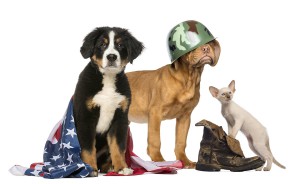 As the First Preston HT team gets ready to celebrate our great nations’ adoption of the Declaration of Independence, (better known as the Fourth of July) images of picnics, barbeques, pool parties, and fireworks come to mind. One of my favorite parts of celebrating the Fourth is watching incredible firework displays.
As the First Preston HT team gets ready to celebrate our great nations’ adoption of the Declaration of Independence, (better known as the Fourth of July) images of picnics, barbeques, pool parties, and fireworks come to mind. One of my favorite parts of celebrating the Fourth is watching incredible firework displays.
For those of us with furry family members it’s important to know how fireworks can affect our pets and how to practice pet safety. Unfortunately they don’t enjoy the sounds and sights of fireworks like their human friends do.
In fact, the Fourth of July, when compared to other major holidays, reports the busiest day for animal shelters all year long. The Indiana Protective Animal Welfare, Inc. (PAW) remarked that animal shelters on July 5 are “inundated with pets that panicked at the noise of firecrackers and fled into the night, winding up lost, injured or killed.”
So how can you keep your pets safe from this weekend’s festivities? Here are ten tips provided by PetMD.com:
1. Keep your Pet Indoors at All Times! – It may seem obvious, but even if your pet is used to being outside, the resulting panic caused by fireworks or other loud noises may make them break their restraint or jump a fence in a terrified attempt to find safety.
2. Don’t Put Insect Repellent on Your Pet that isn’t Specifically for Pet Use – The same tip applies to applying “people” sunscreen on your pet. What isn’t toxic to humans can be toxic to animals. The ASPCA lists the poisonous effects of sunscreen on your pet as, “…drooling, vomiting, diarrhea, excessive thirst, and lethargy.” DEET, a common insecticide, may cause neurological issues.
3. Alcoholic Drinks Poison Pets – If your pet drinks alcohol, they can become dangerously intoxicated, go into a coma, or in severe cases, die from respiratory failure. Yes, even beer is toxic; fermented hops and ethanol are poisonous to dogs and cats.
4. Going to a Fireworks Display? Leave Your Pet at Home – The safest place for your pet is at home, not in a crowded, unfamiliar and noisy place. The combination of too many people and loud fireworks will make your beloved pet freak out and desperately seek shelter. Locking them in the car is also not an option; your pet may suffer brain damage and heat stroke.
5. Have Your Pet Properly Identified – If your pet manages to break loose and become lost, without proper identification it will be that much harder to get them back. Consider fitting your pet with microchip identification, ID tags with their name and your phone number, or both. It is also a good idea to have a recent picture of your pets in case you have to put up signs.
 6. Keep Your Pet Away from Glow Jewelry – It might look cute, but your pet could chew up and swallow the plastic adornments. The ASPCA states that while not highly toxic, “excessive drooling and gastrointestinal irritation could still result from ingestion, and intestinal blockage could occur from swallowing large pieces of the plastic containers.”
6. Keep Your Pet Away from Glow Jewelry – It might look cute, but your pet could chew up and swallow the plastic adornments. The ASPCA states that while not highly toxic, “excessive drooling and gastrointestinal irritation could still result from ingestion, and intestinal blockage could occur from swallowing large pieces of the plastic containers.”
7. NEVER Use Fireworks Around Pets – While lit fireworks can pose a danger to curious pets and potentially result in severe burns and/or trauma to the face and paws, even unused fireworks can be hazardous. Some fireworks contain potentially toxic substances such as arsenic, potassium nitrate, and other heavy metals.
8. Don’t Give Your Pet “Table Food” – If you are having a backyard barbeque, you may be tempted to slip some snacks to your pet. But like beer and chocolate, there are other festive foods that could harm your pet. Onions, coffee, avocado, grapes, raisins, salt, and yeast dough are all possible hazards for dogs and cats.
9. Lighter Fluid and Matches Are Harmful to Pets – The ASPCA lists chlorates as a harmful chemical substance found in some matches that, if ingested, can cause your pet difficulty in breathing, damage blood cells or even cause kidney disease. If exposed to lighter fluid, your pet may sustain skin irritation on contact, respiratory problems if inhaled, and gastric problems if ingested.
10. Citronella Insect Control Products Harm Pets Too – Oils, candles, insect coils and other citronella-based repellents are irritating toxins to pets, according to the ASPCA. The result of inhalation can cause severe respiratory illnesses such as pneumonia, and ingestion can harm your pet’s nervous system.
First Preston HT wishes you, your family and pets a safe and happy Fourth of July. For information on effective ways to manage institutional and individual portfolios nationwide, or to shop for real estate visit First Preston HT. Like us on Facebook. Follow us on Twitter.
